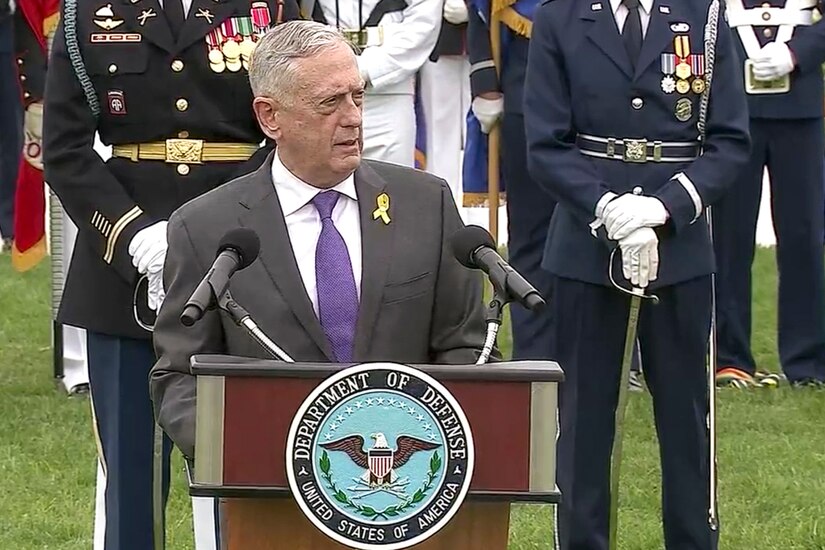By John D. Banusiewicz, DoD News, Defense Media Activity
WASHINGTON -- Service members who were held as prisoners of
war and those still missing from the nation’s wars deserve respect and
admiration from the nation for which they fought, Defense Secretary James N.
Mattis said here today.
Mattis hosted the Defense Department’s annual National
POW/MIA Recognition Day ceremony at the Pentagon River Terrace Parade field.
“Those who don the uniform -- in particular, those who
suffered in captivity or have gone missing in distant lands – serve as enduring
proof that America still turns out warriors of true character and grit,” the
secretary said.
While all who have worn the uniform deserve admiration,
Mattis said, those who were prisoners of war “deserve our deepest respect.”
“We recognize the crucible that they went through,” he said,
“and we will never let their sacrifices wither in the compost of history. They
returned home to us as role models for honor and courage, and we remember their
uniquely tested heroism every day.”
That heroism, Mattis said, is embodied by Air Force Chief
Master Sgt. William Tiffins, who was present at today’s event with his family.
Tiffins served as a soldier in World War II and was held by the Germans as a
prisoner of war for 18 months and eagerly re-enlisted as an airman when he
returned home. The secretary also noted the sacrifices of Arizona Sen. John
McCain, who was a prisoner of war during the Vietnam War. McCain died Aug. 25.
“[He] did not let the torture that he endured define his
lasting service to America,” the secretary said. Like Tiffins, he said, McCain
returned home eager to serve again, “dedicating his life to public service with
what his daughter Meghan called ‘ferocity and faith.’”
Honoring the Missing
As the nation honors those service members who returned
after enduring captivity by the enemy, Mattis said, it also honors those still
missing in action and those awaiting their return. “And we thank their families
for their unrelenting courage and faith as we strive to bring them home,” he
added, noting that some of them were on hand for today’s observance.
The secretary expressed gratitude to Defense POW/MIA
Accounting Agency, veteran service organizations and other advocates for their
“fierce resolve and “tireless commitment” to realize the mission of accounting
for those still missing. Their work gives today’s warriors great confidence
that their nation will “go to the ends of the Earth to bring them home.”
DPAA conducted 45 recovery missions and 36 investigations
around the world in the past year, Mattis said, and identified 172 individuals
from World War II, the Korean War and the Vietnam War.
Mattis noted that in August, 55 cases of remains were
returned to the United States from North Korea. He said President Donald J.
Trump made this a priority in his meeting with North Korean leader Kim Jong Un,
and that DPAA has identified two service members among the remains: Army Master
Sgt. Charles H. McDaniel and Army Pfc. William H. Jones.
“Our POWs, our missing in action, their families – they have
met the most terrible challenges undeterred, with the highest fortitude,
honoring a nation that loves them for what they call out in each of us,” Mattis
said. “And for that, we owe them an irredeemable debt of gratitude.”
Presidential Proclamation
“On National POW/MIA Recognition Day, we honor all American
prisoners of war and express our deep gratitude for the courage and
determination they exemplified while enduring terrible hardships,” Trump said
in his proclamation marking this year’s event.
The president also stressed the importance of accounting for
those still missing.
“As a nation, it is our solemn obligation to account for the
remains of our fallen American service members and civilians and to bring them
home whenever possible. We owe an incalculable debt of gratitude to these
patriots who gave their last full measure of devotion for our country. For this
reason, I have pledged my administration’s best efforts to account for our
country’s missing heroes.
“We continue to work to account for the missing personnel
from the Vietnam War,” he continued. “American and partner nation search teams
are also working tirelessly in South Korea, Europe, the South Pacific, and
elsewhere around the world to recover and identify those who served in World
War II, the Korean War, the Cold War, and other past conflicts.”







